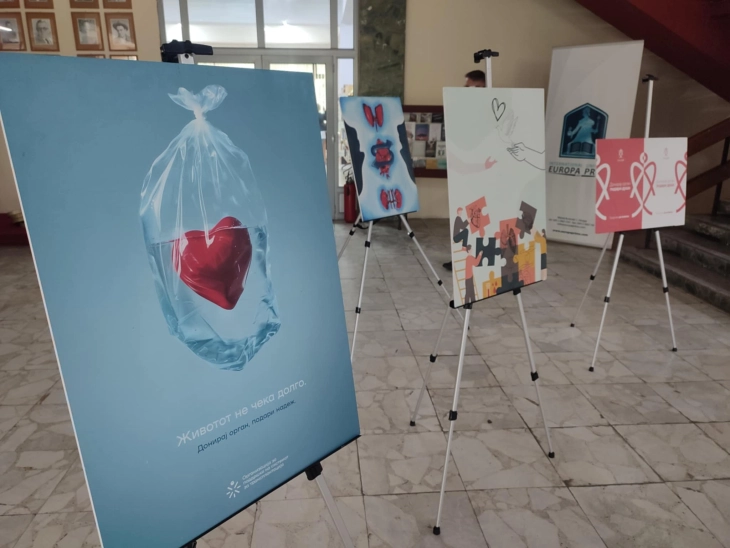European Day for Organ Donation and Transplantation marked in Skopje, 85 transplants performed in less than four years
- An event to mark the European Day for Organ Donation and Transplantation, October 7, was held at the Cinematheque on Monday, as part of the activities under the "Support to the Transplantation System" project in the country, financed by the European Union. Participants in the event sent the message that awareness of organ donation can be increased through education of medical personnel, the population and the media.

Skopje, 7 October 2024 (MIA) – An event to mark the European Day for Organ Donation and Transplantation, October 7, was held at the Cinematheque on Monday, as part of the activities under the "Support to the Transplantation System" project in the country, financed by the European Union. Participants in the event sent the message that awareness of organ donation can be increased through education of medical personnel, the population and the media.
Minister of Health, Arben Taravari, said all health professionals have a common goal of increasing awareness of organ donation through education of medical personnel and the population. He noted that there are currently no patients marked as urgent on the list of heart, liver and kidney transplants.
"The message of this humanitarian act is to reach the public. The importance of organ donation is huge, it means life for people who are waiting for organ transplantation, which is a chance to extend their lives and a chance for a better quality of life for these patients," he said.
The Minister mentioned ongoing activities in this domain, including the cooperation with Croatia's Ministry of Health, which has provided recommendations on improving the system in terms of legislation, alignment with EU standards and organization of the system.
"Trainings of our doctors are active in the area of detection of brain-dead patients, conversations with the families, detection of patients with heart failure as well as preparation and monitoring of patients. Training for hospital transplant coordinators begins in November. Our commitment is continuous improvement of the system," said Taravari.

EU Delegation representative, Maria Kanellopoulou, told the event that the European Commission noted that progress has been made in terms of organ donation and transplantation in the country, as well as efforts towards modern procedures for transplanting blood platelets.
"In the case of North Macedonia, we see that possibilities are being explored with several European organizations for transplantation. This area of tissue, bone and organ donation and transplantation is the first area where the EC has introduced rules and procedures to ensure that there are standards for everyone's safety. There are many laws in place and two key principles that govern organ donation, they should come from deceased or living organs, on a voluntary basis, and the procurement is on a non-profit basis," she noted.
She added that it is vital for each country to develop structures, train staff and establish infrastructure to fully apply these regulations, stressing that it is very important to retain experienced staff and upgrade their knowledge.
According to the National Transplant Coordinator, Biljana Kuzmanovska, the development of transplant medicine is a possibility of giving patients an organ that will mean added years of life, as well as added quality in the years of life they will receive.
"Hence the importance of the awareness about organ donation, of both the medical staff and the general population. Awareness of organ donation is raised through the education of healthcare professionals from their student days, who will later grow into experts, and media education is also important," she pointed out.
Vasko Jolevski from the "Brave Heart" association shared how important this humanitarian act is for patients.
"At the moment when we cannot do anything for a loved one, we have to be extremely humane, to make a difficult decision, let part of our loved one live in someone else, i.e. save someone's life," he said.
The Republic of North Macedonia marks the European Day for Organ Donation - October 7 with 85 donated organs in less than four years, of which 38 kidneys, 11 hearts, four livers and 32 bone tissues.
The first heart transplant was performed in 2020, the first bone tissue transplant in 2021, while the first liver transplant was performed in 2022.
Photo: MIA







